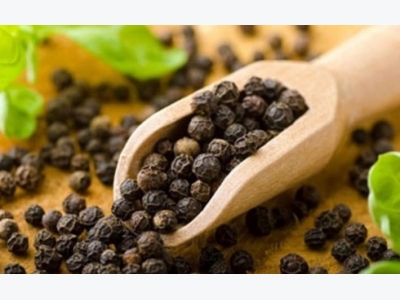Black pepper market heats up on low supplies in India

Do Ha Nam, chair of the Vietnam Pepper Association, who was up until recently bullish about the black pepper market, has now turned bearish, advising farmers to hold off from selling if they can.
Vietnamese farmers had a record crop of roughly 200,000 tons of black pepper this year (almost half the globe’s total production) and as a result prices have dropped to US$5,000 per ton.
Indian pepper prices are, however, hovering around US$9,000 per ton, due to lack of inventories, which makes Vietnamese exports highly price competitive, Mr Nam noted.
This has given rise to a surge of exports from Vietnam to India.
Many consignments to India, he acknowledged, are rumoured to have been transhipped to India through Sri Lanka to take advantage of the lower tariffs accorded by a free trade agreement between the two countries
Indian exports dropped by nearly half from 2,500 tons to 1,000 tons last fiscal year, said Mr Nam, and the best estimates are that the declining trend may persist this year as well.
If true, that would put upward pressure on pepper prices throughout the remainder of the year.
The global pepper markets have shown some slight improvement during the past week as prices increased at most origins.
In Vietnam, the price increased daily from a seven year low of US$3.52 (VND80,000) per kilogramme for black at the beginning of the week to US$3.74 (VND85,000) per kilogramme at the week’s close.
However, Nguyen Thi Do, a pepper farmer in Dak Nong Province, says she can’t hold off and needs money to make the payments on a bank loan of US$178,770 (VND4 billion) used to plant trees on the family 10 hectare plot.
Ms Do says she took out the loan planning on selling the harvest at US$8.93 (VND200,000) per kilogramme but now with the lower prices she’ll be lucky to break even and payoff the loan.
She might even be forced to sell the land to reimburse the bank.
The authorities of the Central Highlands region say farmers should consider planting the next crop using organic farming methods to augment sales and earnings. Organic pepper is produced without using any chemical fertilizers and pesticides.
The processing methods from harvesting to drying is meticulously done to not only free the final product of harmful chemical residue but also of any contaminants such as sand, skins or dust.
If farmers would undertake these extra efforts, they would gain more international recognition for quality Vietnamese pepper, they said, and be able to command a premium price.
The authorities say they are also currently doing more research to upgrade production by modernizing processing methods and considering alternative branding options for berries.
Right now, they said, there is not much Vietnamese farmers can do other than sit back and wait as long as they can for the price to climb even higher over the coming months.
Có thể bạn quan tâm
Phần mềm

Phối trộn thức ăn chăn nuôi

Pha dung dịch thủy canh

Định mức cho tôm ăn

Phối trộn phân bón NPK

Xác định tỷ lệ tôm sống

Chuyển đổi đơn vị phân bón

Xác định công suất sục khí

Chuyển đổi đơn vị tôm

Tính diện tích nhà kính

Tính thể tích ao hồ




 Red River Delta promotes hi-tech agricultural production
Red River Delta promotes hi-tech agricultural production  Firms with green production earn more benefits: workshop
Firms with green production earn more benefits: workshop